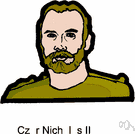czar
Also found in: Thesaurus, Legal, Acronyms, Encyclopedia, Wikipedia.
Related to czar: Russian Revolution
czar
(zär, tsär)n.
1. also tsar or tzar (zär, tsär) A male monarch or emperor, especially one of the emperors who ruled Russia until the revolution of 1917.
2. A person having great power or authority: an energy czar.
[Russian tsar', from Old Russian tsĭsarĭ, emperor, king, from Old Church Slavonic tsěsarĭ, from Gothic kaisar, from Greek, from Latin Caesar, emperor; see caesar.]
czar′dom n.
Usage Note: The word czar, a borrowing from Russian originally referring to the emperor of Russia, is a cousin of the German word Kaiser; both words descend from the name of the Roman emperor Julius Caesar. The spelling tsar is preferred in most Slavic scholarship, as it follows the standard conventions of Russian transliteration. The spelling czar is the more common form in American English, and is the only one employed in the extended sense "someone in authority," as in energy czar.
American Heritage® Dictionary of the English Language, Fifth Edition. Copyright © 2016 by Houghton Mifflin Harcourt Publishing Company. Published by Houghton Mifflin Harcourt Publishing Company. All rights reserved.
czar
(zɑː)n
(Historical Terms) a variant spelling (esp US) of tsar
ˈczardom n
Collins English Dictionary – Complete and Unabridged, 12th Edition 2014 © HarperCollins Publishers 1991, 1994, 1998, 2000, 2003, 2006, 2007, 2009, 2011, 2014
czar
or tsar
(zɑr, tsɑr)n.
1. an emperor or king.
2. (often cap.) the former emperor of Russia.
3. an autocratic ruler or leader.
4. any person exercising great authority or power: a czar of industry.
[1545–55; < Russian tsar', Old Russian tsĭsarĭ emperor, king (akin to Old Church Slavonic tsěsarĭ) < Gothic kaisar emperor (< Greek or Latin); Greek kaîsar < Latin Caesar Caesar]
czar′dom, n.
Random House Kernerman Webster's College Dictionary, © 2010 K Dictionaries Ltd. Copyright 2005, 1997, 1991 by Random House, Inc. All rights reserved.
ThesaurusAntonymsRelated WordsSynonymsLegend:
Switch to new thesaurus
| Noun | 1. |  czar - a male monarch or emperor (especially of Russia prior to 1917) czar - a male monarch or emperor (especially of Russia prior to 1917)Russia - a former empire in eastern Europe and northern Asia created in the 14th century with Moscow as the capital; powerful in the 17th and 18th centuries under Peter the Great and Catherine the Great when Saint Petersburg was the capital; overthrown by revolution in 1917 |
| 2. | czar - a person having great power |
Based on WordNet 3.0, Farlex clipart collection. © 2003-2012 Princeton University, Farlex Inc.
Translations
car
car
tsaar
tsaari
car
cár
tsar, keisari
cars
cár
car
tsar
Collins Spanish Dictionary - Complete and Unabridged 8th Edition 2005 © William Collins Sons & Co. Ltd. 1971, 1988 © HarperCollins Publishers 1992, 1993, 1996, 1997, 2000, 2003, 2005
Collins English/French Electronic Resource. © HarperCollins Publishers 2005
czar
n → Zar m
Collins German Dictionary – Complete and Unabridged 7th Edition 2005. © William Collins Sons & Co. Ltd. 1980 © HarperCollins Publishers 1991, 1997, 1999, 2004, 2005, 2007
Collins Italian Dictionary 1st Edition © HarperCollins Publishers 1995
tsar,
czar,
tzar
(zaː) noun (the status of) any of the former emperors of Russia. He was crowned tsar; Tsar Nicholas.
Kernerman English Multilingual Dictionary © 2006-2013 K Dictionaries Ltd.